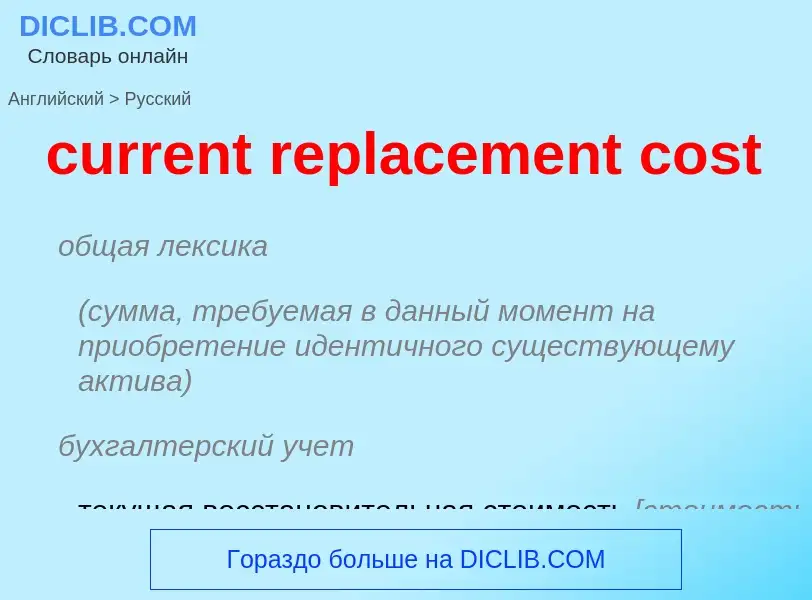Translation and analysis of words by ChatGPT artificial intelligence
On this page you can get a detailed analysis of a word or phrase, produced by the best artificial intelligence technology to date:
- how the word is used
- frequency of use
- it is used more often in oral or written speech
- word translation options
- usage examples (several phrases with translation)
- etymology
current replacement cost - translation to English
общая лексика
(cумма, требуемая в данный момент на приобретение идентичного существующему актива)
бухгалтерский учет
текущая восстановительная стоимость [стоимость замещения]
синоним
Смотрите также
статистика
восстановительная стоимость
стоимость замещения (фактическая цена, по которой может быть куплен точно такой же актив на дату отчетности)
сельское хозяйство
стоимость ремонта (стада) (стоимость замены низкопродуктивных, больных или старых животных молодыми, здоровыми и высокопродуктивными)
бухгалтерский учет
стоимость замещения имущества (текущая стоимость замены собственности в определенном географическом районе)
нефтегазовая промышленность
стоимость замены (устаревшего оборудования)
синоним
антоним
Definition
Wikipedia
The term replacement cost or replacement value refers to the amount that an entity would have to pay to replace an asset at the present time, according to its current worth.
In the insurance industry, "replacement cost" or "replacement cost value" is one of several methods of determining the value of an insured item. Replacement cost is the actual cost to replace an item or structure at its pre-loss condition. This may not be the "market value" of the item, and is typically distinguished from the "actual cash value" payment which includes a deduction for depreciation. For insurance policies for property insurance, a contractual stipulation that the lost asset must be actually repaired or replaced before the replacement cost can be paid is common. This prevents overinsurance, which contributes to arson and insurance fraud. Replacement cost policies emerged in the mid-20th century; prior to that concern about overinsurance restricted their availability.
If insurance carriers honestly determine replacement cost, it becomes a "win-win" for both for the carriers and the customers. However, when a replacement cost determination is made by the carrier (and, perhaps, its third party expert) that exceeds the actual cost of replacement, the customer is likely to be paying for more insurance than necessary. To the extent that the carrier has knowingly or carelessly sold excessive (i.e. unnecessary) insurance, such a practice may constitute consumer fraud.
Replacement cost coverage is designed so the policy holder will not have to spend more money to get a similar new item and that the insurance company does not pay for intangibles. For example: when a television is covered by a replacement cost value policy, the cost of a similar television which can be purchased today determines the compensation amount for that item. This kind of policy is more expensive than an Actual Cash Value policy, where the policyholder will not be compensated for the depreciation of an item that was destroyed. The total amount paid by an insurance company on a claim may also involve other factors such as co-insurance or deductibles. One of the champions of the replacement cost method was the Dutch professor in Business economics Théodore Limperg.

